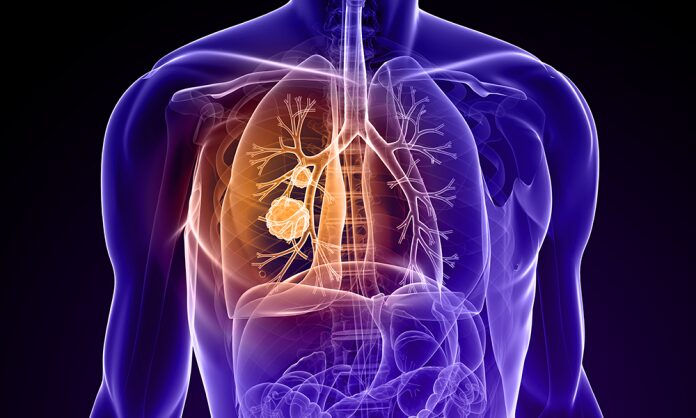
Table of Contents
Lung cancer is an incredibly debilitating condition that is difficult to identify when it is in its early stages. Because of this, it is incredibly challenging to treat. The majority of lung cancer cases are identified at later stages. Like most forms of cancer, it is easier to treat when the early signs have been spotted.
Here are some of the most common symptoms of lung cancer that you should be aware of. Check out the latest lung cancer clinical trials for more information about less common symptoms like the ones available at WithPower.
1. Persistent Cough

One of the most noticeable symptoms of lung cancer is a persistent cough. If you have been suffering from a cough for 2-3 weeks that hasn’t gone away, then it could be a sign of something more serious. A raspy, constant, hacking cough is also a symptom of many forms of lung cancer.
Other symptoms relating to a persistent cough include aching in the chest area when you are coughing. If you are producing blood, mucus, or rust-colored sputum when you cough, then it is important to speak with your doctor or a medical professional soon.
Because of the persistent coughing that is a prominent symptom of lung cancer, it is likely that you will experience a hoarse voice. Even though this can be caused by excessive coughing, it can be a symptom on its own.
Ask a friend or loved one if they think that your voice sounds different than usual because your voice will sound different to you than it does to others. This is due to bone conduction, and it is worth getting a second opinion when you are trying to assess your symptoms.
2. Breathing Difficulties
In addition to a persistent cough, breathing difficulties are a common symptom of lung cancer. The entire respiratory system can be affected in more severe cases, and if you find yourself struggling to breathe or swallow, then it could be a sign of lung cancer.
It can also be a sign of lung cancer if you are experiencing chest pain that worsens when you breathe deeply, laugh, or cough. Shortness of breath when you are carrying out your regular activities or routine can also be an indication that something more serious is wrong.
Lasting chest pain, in general, is cause for concern, especially if it seems to have come out of nowhere. As well as lung cancer, chest pain can be a sign of something more serious in general. This includes cardiovascular conditions such as a heart attack.
Wheezing when you are resting is another symptom of lung cancer. This is especially true if you do not have a history of asthma or other inflammatory conditions. Make sure you seek medical attention if you suddenly notice a wheeze when you inhale and exhale.
3. Recurring Infections

Another common symptom of lung cancer is if you suffer from recurring infections. Chest infections that come back on a regular basis are one of the more alarming indicators that something serious is wrong.
Because of this, it is crucial that you seek medical attention if you find yourself suffering from bronchitis, pneumonia, or other chest infections that don’t go away. Sometimes, more general infections such as the common cold can be a sign of lung cancer.
This is because it is an indicator that the body is not working properly and that it is struggling to fight infections consistently. If you have been unwell for longer periods of time than expected, then it is highly recommended that you contact your healthcare provider and discuss a chest X-ray.
4. Changes In Energy Levels And Appetite
If you have experienced a sudden reduction in your energy levels and appetite without actively making an effort to do so, then it can be a sign of lung cancer. Lower energy levels, excessive fatigue, and feeling weak can occur when the body is suffering from a more significant condition.
This is because of the excessive efforts that the cells within the body are going through to attempt to localize and eliminate cancer cells. There is very little left over for regulating energy levels in general.
As a result, a common symptom of lung cancer, or any form of cancer in the body, is a significant reduction in energy levels. Feeling like you don’t have any strength, or like you have suddenly become extremely weak, is a direct result of the body working hard to protect itself.
Weakness, in general, is cause for concern if it has come out of nowhere, but feeling constant pain or weakness in the shoulder, hand, or arm, are symptoms of lung cancer to be aware of.
Another symptom to be aware of is unexplained weight loss or sudden loss of appetite. This can happen in severe cases when cancer has spread to other parts of the body. Losing weight randomly is usually cause for alarm because it can be a sign that something is not functioning correctly.
Similarly, a loss of appetite can be a sign of lung cancer or other forms of cancer. This is alarming if the person has not made a conscious effort to eat less, and if they are suddenly uninterested in eating.
Our bodies need food in order to replenish energy levels, which is why we have an appetite. Suddenly losing this can impact someone’s motivation to fuel their body, and significantly impact their energy levels as a result.
5. When To Call A Doctor

It is recommended that you contact your healthcare provider or speak with a doctor if you have been experiencing any or multiple of the symptoms above. This is especially true if the symptoms seem to have appeared out of nowhere.
Contacting your doctor for minor coughs and infections is a little less necessary, but it could be worth getting a health check in general if you are concerned about signs of lung cancer. Speaking with a medical professional can put you at ease, and give you peace of mind knowing that you are doing everything you can.
A doctor can show you more specific symptoms to look out for based on your age, lifestyle, and the different types of lung cancer.
6. Risk Factors
There are multiple ways that you can minimize your risk of getting lung cancer. Some of these include lifestyle changes, such as quitting smoking, while others cannot be helped. These include viral infections like human papillomavirus (HPV), which can increase the chances of developing lung cancer.
It is worth getting medical attention when you aren’t sure about your symptoms or if you have a family history of lung cancer.
If you have a family history of lung cancer, then it is also recommended that you avoid some of the most common risk factors. These include tobacco smoke and exposure to chemicals and radiation.

Summary
Lung cancer can be debilitating, and it impacts someone’s respiratory tract. It can block the breathing passages including the throat, and other processes in the body. As a result, some of the most common symptoms of lung cancer include a sudden loss of appetite, pain in the shoulder and arm, and a persistent cough.
If you can, it is worth cutting out some of the most common risk factors for lung cancer. This can reduce your chances of developing a life-changing condition. Make sure you are contacting your doctor if you are suffering from any of the symptoms above, or if you have a family history of lung cancer that you want to get checked for.
















